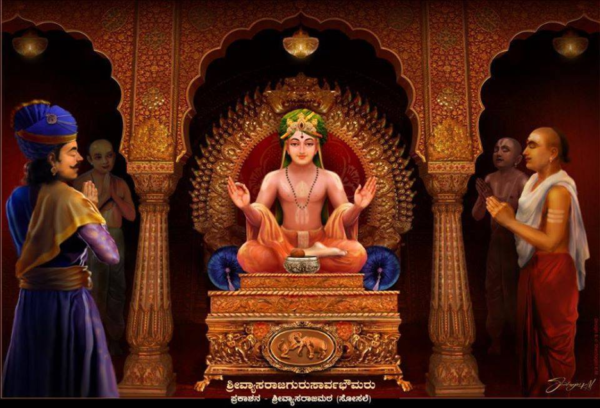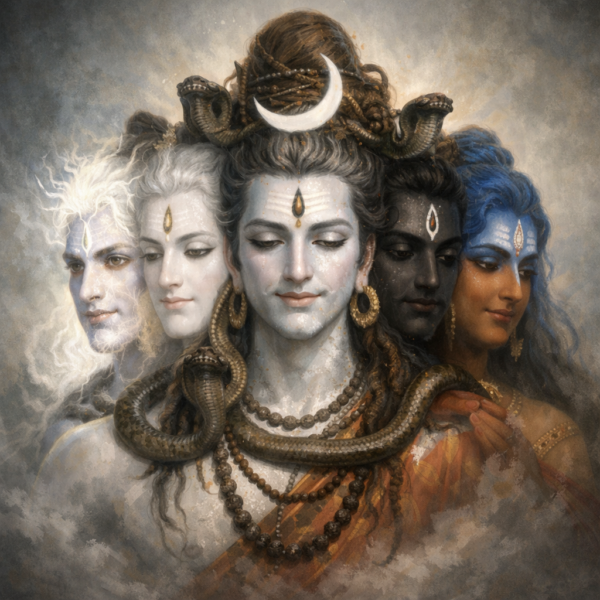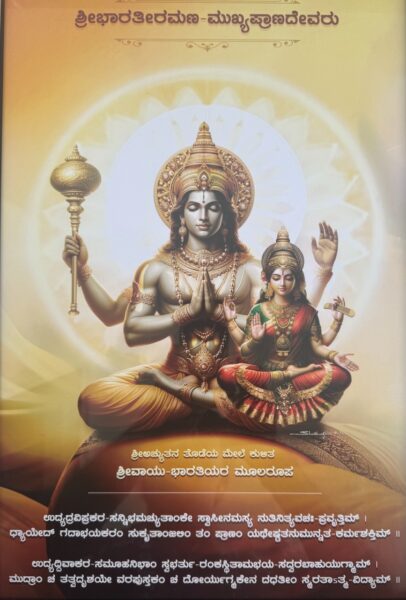हरि सर्वोत्तम । वायु जीवोत्तम | श्री गुरुभ्यो नमः

नारायण वर्म (श्री वादिराजयति विरचित)
(इदन्नु मॊदलु अंदु आमेलॆ लक्ष्मीहृदय अंदु मत्तॆ नारायण वर अंदरॆ विशेष फल मत्तु शुक्रवार मंगळवार तप्पदॆ अन्नबेकु)
सकल ऋषिगळल्लि हरि नम्म स्वामियागि रक्षिसु
जलदल्लि मच्चावतारनागि, स्थळदल्लि वामननागि रक्षिसु
निम्म नॆनॆवरा आकाशदलि त्रिविक्रमनागि रक्षिसु
भयगळल्लि नारसिंहनागि, मार्गदल्लि वराहनागि रक्षिसु
निम्म नेनॆवरा पर्वताग्रदल्लि, परशुरामनागि रक्षिसु
परदेशदल्लि रामचंद्रनागि रक्षिसु
रक्षिसु निम्म नॆनॆवरा, आश्रयदल्लि नरनारायणनागि रक्षिसु
अयोग्यरल्लि दत्तात्रयनागि रक्षिसु
कर्म बंधगळॆल्ल कळॆदु रक्षिसु कपिल मूर्तियागि
प्रातः कालदल्लि केशव नम्म रक्षिसु
संगम कालदल्लि गोविंद नम्म रक्षिसु
अपराह्न कालगळॆल्ल कळॆदु, रक्षिसु नम्म सकल कालगळॆल्ल
नरकदिंद कूर्मनागि रक्षिसु
कुपत्तिनिंद धन्वंतरि रक्षिसु
अन्य देवतॆ भजनॆ कळॆदु, रक्षिसय्य श्रीकृष्ण मूरुतियागि
अज्ञान विषयगळ कळॆदु रक्षिसु, वेदव्यास मूर्तियागि
कृष्णन शंखवॆ निम्म धनिदुरि
राक्षासर ऎदॆ ऒडॆसि भयबडिसि लयवनॆ माडिसि
पूत गंधर्वरु कूश्मांड तोरिसलु
विष्णुगदा राक्षसरु ऒडॆदु चर्णव माडि
किडिगळंतॆ भूमि मेलॆ आधरिसि
शतचंद्र प्रभॆयंतॆ, हॊळॆव हरियु नम्म
मतिवंतरु वैरिगळ कण्णिगॆ काणबारदु माडि
तोरिसि तम्म दिव्यतेजगळ, धर्मविषयदल्लि हयग्रीवनागिरक्षिसु
मध्यान्ह कालदल्लि मधुसूदननागि रक्षिसु
सायंकालदल्लि श्रीवत्समूर्तियागि, उषः कालदल्लि जनार्दननागि रक्षिसु
त्रिसंध्याकालदल्लि दामोदरनागि विश्ववमूर्तियागि रक्षिसु
अर्धरात्रियल्लि हृषिकेशनागि, अपरात्रियल्लि रक्षिसय्य श्रीवत्समूर्तियागि
सामवेदकॆ अभिमानियाद गरुडवाहननॆ सलुहॆन्न विषद भयगळ बिडिसि
कृष्ण मुकुटाधरनॆ रक्षिसॊ नम्मन्न प्राणेंद्रियदिंद
बुद्धियिंद दिक्कु दिक्कुगळल्लि, नारसिंहमूर्तियागि
नारसिंहनादगळिंद ऎल्ल परियिंद भक्तरनॆल्ल नरहरि इद्दु रक्षिसॊ
गुरु मध्वरायर गुरु विश्वव्यापकर सुविष्णु वैष्णवर
मगनंतॆ निम्म सुनाम ऎंदु पाडि सुखियागि
जमदग्नि वत्स, प्रह्लादवरद, असुरर गॆलिद बलराम
जानकिवल्लभ जय जयराम, नित्यवैकुंठ निज गोविंद
अंबरिषरायगे वरगळ कॊट्ट, नंबिद भक्तरिगॆ अभयव कॊट्ट
यशोदॆय मन उद्धरिसिद,
हयवदनरक्षिसु हयवदनरक्षिसु हयवदनरक्षिसु
षष्ठ मस्कंद अष्टमोध्याय इंद्रनु उपदेशिसिद नारायणमर्म संपूर्णं
श्री कृष्णार्पणमस्तु
लक्ष्मीहृदय
श्री देवि तानू श्री धामन्न मनॆयल्लि, आदि अंत्यगळिल्लदिरलु
सोउख्य सुख रूपदिंद, अवळिगॆ वेद वालिगळ ओदुतिरलु
अवळिंद हरियु, मूरु मनॆ गळिप्पलयकॆ
तन भयविल्ल, मॊदलॆ उदकविल्ल
आद कारणदिंद, मुददि तानादळु, अच्युतगॆ अंबुधियादळु
आग महालकुमि, अंबरद आभरणवादळु, पॊंबण्णद आलदॆलॆयादळु
एनॆंबॆ इवळ साहसकॆ, श्री भू दुर्गेर आलिसिदनु
हरियु तानालदॆलॆय मेलॆ मलगिदनु
अच्युतन हृदयदल्लि, लिंग विशिष्टराद
इनितु जीवर हिडि तुंबाकॊंडु, तनयन नूरु वर्ष
परियंतरदि, वनजाक्ष वटपत शयननागि
जनरॆल्ल तम्म तम्म गतिगॆ
तक्क साधनव साधिसि कॊळ्ळलॆंदु
तरुणि पुनरपि सृष्टिय माडुवॆनॆंदु
लालनॆगॆ प्रकृतिय ममतॆ इत्तु
गुणत्रयात्मक, सूक्ष्म तत्वराशिय
जीवरनु सृजिसिद, हयवदननु ॥
श्री कृष्णार्पणमस्तु
Here is a translation from MadhvaGPT (as of 12 Aug 2025):
Nārāyaṇa Varma
(Composed by Śrī Vādirāja Yati)
(This should be recited first, then “Lakṣmī Hṛdaya,” and again “Nārāyaṇa Varma” — it is said to give special benefit, especially if recited without fail on Fridays and Tuesdays.)
O Lord Hari, the master of all sages — protect me!
• In water, protect me as Matsya; on land, protect me as Vāmana.
• Remembering You, protect me in the sky as Trivikrama.
• In times of fear, protect me as Narasimha; on my path, protect me as Varāha.
• Remembering You, on the mountain peaks, protect me as Paraśurāma.
• In foreign lands, protect me as Rāmacandra.
• In places of refuge, protect me as Nara-Nārāyaṇa.
• Among the unworthy, protect me as Dattātreya.
• Destroy all my karmic bonds and protect me as Kapila.In the early morning, protect me as Keśava.
At holy confluences, protect me as Govinda.
In the afternoon and all other times, protect me in every moment.
From hell, protect me as Kūrma.
From disease, protect me as Dhanvantari.
Removing devotion to other gods, protect me as Śrī Kṛṣṇa.
Removing ignorance, protect me as Vedavyāsa.
O Kṛṣṇa, Your conch is Your wealth;
You break the chests of the demons, instilling fear and destroying them.
May celestial beings like Puṣṭa Gandharvas and Kūṣmāṇḍas be shown their place.
With Your mighty mace, destroy the demons,
and crush them to dust, like sparks falling to earth.
Like the brilliance of a hundred moons, shine upon us.
O Hari, make it so that the wise devotees are unseen by the eyes of enemies.
Reveal Your divine radiance; in the realm of dharma, protect me as Hayagrīva.
At midday, protect me as Madhusūdana.
In the evening, protect me as Śrīvatsa-mūrti; at dawn, protect me as Janārdana.
At all three sandhyās, protect me as Dāmodara, the Universal Form.
At midnight, protect me as Hṛṣīkeśa; in the later night hours, protect me as Śrīvatsa-mūrti.
O Lord of Garuḍa, protector of the Sāma Veda, remove my fears of poison.
O Kṛṣṇa, crowned with the peacock feather, protect my life-force and senses.
With my intellect and in all directions, protect me as Narasimha.
By the sound of Narasimha’s name, in every way, protect all devotees as Narahari.
O Supreme Viṣṇu, teacher of Guru Madhvācārya, all-pervading Lord of the Vaiṣṇavas,
May I, like a son, sing Your glorious name and be joyful.
O son of Jamadagni, O boon-giver to Prahlāda, O Balarāma who defeated the asuras,
O beloved of Jānakī, victory, victory to You, O Rāma!
O eternal Vaikuṇṭha’s true Govinda!
O giver of boons to King Ambarīṣa,
O protector who grants fearlessness to trusted devotees,
O uplifter of Yaśodā’s heart,
Protect us, O Hayavadhana! Protect us, O Hayavadhana! Protect us, O Hayavadhana!
From the Sixth Skanda, Eighth Adhyāya — the Nārāyaṇa Marma taught by Indra — complete.
Śrī Kṛṣṇārpaṇamastu.
Lakṣmī Hṛdaya
Śrī Devī herself resides in Śrī Dhāma, with no beginning and no end.
Being the very form of bliss and comfort, she listens to the chants of the Vedic scholars.
From her arises Lord Hari, the ruler of the three worlds.
She has no fear, no need for protection.
Because of her joy, she became the ocean to the infallible Acyuta.
Thus Mahā Lakṣmī became the ornament of the sky,
shining like the golden lotus leaf.
Hearing of her greatness, Śrī Bhū Devī and Durgā revered her.
The Lord reclined upon that golden lotus leaf.
In the heart of Acyuta, uniquely distinguished,
she held countless souls within her care for a hundred divine years.
At the right time, the lotus-eyed Lord, resting under the banyan tree,
created the world again so that all souls may attain their destined goals.
Out of affection for the young creation,
from the subtle elements and the guṇas,
the Hayavadhana (Hayagrīva) created the jīvas anew.
Śrī Kṛṣṇārpaṇamastu.
Nārāyaṇa Varma – Madhva Commentary
- “Sakala ṛṣigaḷalli Hari namma svāmiyāgi rakṣisu”
“O Lord Hari, master of all sages — protect me!”
• Madhva perspective: All ṛṣis are jñānīs, but even they have Hari as their supreme master (svāmī). This line establishes Vishnu Sarvottamatva at the very start — no matter how high a jīva rises in knowledge, Hari is the eternal master.- “Jaladal̥li Matsyāvatārnāgi…” • Matsya: Protection in water. Matsya saved the Vedas from the deluge — here, the devotee prays for protection from drowning in the saṁsāra-samudra (ocean of bondage).
• Vāmana on land: Vāmana subdued Bali without violence — here, symbolically, we pray for humility and for Hari to subdue our ego.
• Trivikrama in the sky: Vāmana becomes Trivikrama, covering all worlds — this shows Hari’s vyāpti (omnipresence). By invoking Him here, the devotee seeks protection even in the unseen realms. - “Bhaya gaḷalli Narasiṁhanāgi…” • Narasimha: Protector from fear, especially sudden dangers (āpatkāla). Narasimha is invoked for immediate intervention.
• Varāha on the path: Varāha lifts the Earth — this avatāra represents rescue from deep distress or being “buried” in obstacles. The devotee asks for guidance on life’s journey. - “Parvatāgra dalli Paraśurāmanāgi…” • Paraśurāma is a yugāvatāra representing discipline and destruction of adharma. Protection here means victory over injustice and courage in tough, “mountain-like” challenges.
- “Paradeśadal̥li Rāmacandranāgi…” • Rāma is maryādā-puruṣottama — the perfect dharmic ruler. Invoking Him in foreign lands signifies moral strength and adherence to dharma in unfamiliar situations.
- “Āśrayadal̥li Nara-Nārāyaṇanāgi…” • Nara-Nārāyaṇa are eternal sages in Badarikāśrama, representing tapas and bhakti in harmony. The prayer here is for spiritual refuge.
- “Ayogyaralli Dattātreyanāgi…” • Dattātreya represents teaching even amidst spiritually unqualified people — protection here means retaining one’s sāttvika nature in hostile company.
- “Karma-bandhagaḷella kaḷedu Kapila mūrtināgi…” • Kapila (Sāṅkhya founder) burns away karmic bondage through tattva-jñāna. Madhva’s view: Kapila is a form of Vishnu, not merely a sage — here the prayer is for mokṣa-oriented knowledge.
- Time-based protections (Keśava, Govinda, etc.) • Each nāma is linked to the Dvādaśa Nāma Stotra system —
○ Morning: Keśava — auspicious start.
○ Noon: Govinda — joy of remembering Hari.
○ Evening: Śrīvatsa-mūrti — auspiciousness at closure of day.
○ Midnight: Hṛṣīkeśa — control of senses in deep rest.
This covers all 24 hours, showing Hari’s unbroken guardianship.
- Disease, ignorance, and other deities • Dhanvantari: Cure from illness.
• Śrī Kṛṣṇa: Freedom from anya-devatā bhajana (worship of others). In Madhva-siddhānta, other deities are honored as Hari’s servants but worship is exclusively for Hari.
• Vedavyāsa: Freedom from ajñāna through śāstra. - Hayagrīva, Garuḍa, and Narasimha • Hayagrīva: The deity of jñāna — protection in dharma-vicāra (scriptural debate, learning).
• Garuḍa: Sāma Veda’s protector, destroyer of poison — symbolizing removal of viṣa (worldly poison = bad association).
• Narasimha: Supreme guardian in all directions — in Dvaita, Narasimha’s protection is immediate and fierce. - Closing • The stotra ends with praise to Rāma, Govinda, Balarāma, Hayagrīva — spanning avatāras that protect, teach, and grant mokṣa.
• The repeated “Hayavadana rakṣisu” is a mukhyārtha reminder: All knowledge and liberation flow from Hari as Hayagrīva.
Lakṣmī Hṛdaya – Madhva Commentary
• Lakṣmī’s eternal nature: She is nitya-mukta, without beginning or end, always with Hari in Vaikuṇṭha. Madhva siddhānta affirms that Lakṣmī is ananta-guṇa-paripūrṇa (full of infinite auspicious qualities) and independent of māyā.
• Hari’s emergence from her: Not literally birth — in Madhva philosophy, Lakṣmī and Hari are co-eternal, but in this poetic sense, she is the inseparable consort, and His līlās manifest through her.
• Golden lotus leaf: Symbolizes her śuddha-sattva form — flawless, luminous, and life-giving.
• Lord reclining upon her: Hari rests on her in the form of Śrī Mahālakṣmī-tattva — here, Lakṣmī is ālambana (support) for His līlā of creation.
• Creation of jīvas: Hayagrīva creating beings from subtle tattvas emphasizes that jīvas are anādi but are manifest for lila and sādhanā — never created from nothing.
• Message: Lakṣmī is mukhyopāsya along with Hari in Madhva tradition — this stotra is a complete surrender to both Hari and Lakṣmī as protectors in every state of life./Raghunath Rao/ “Do your Best … and leave the Rest … “
(All mistakes mine – all credit to Gurus and Acharyas )
|| sarvaṁ śrī kṛṣṇārpanamastu ||




